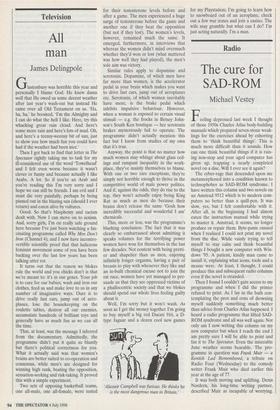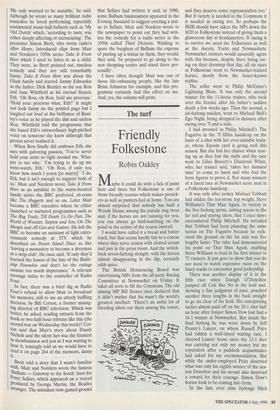Radio
The cure for SAD-ROM
Michael Vestey
Feeling depressed last week I thought of those 1950s Charles Atlas body-building manuals which prepared seven-stone weak- lings for the exercises ahead by exhorting them to 'think beautiful things'. This is much more difficult than it sounds. How can one think beautiful things if it is rain- ing non-stop and your aged computer has given up, trapping a nearly completed novel on a disc. Will I ever see it again?
The cyber-rage that descended upon me metamorphosed into a condition known to technophobes as SAD-ROM syndrome. I have written this column and two novels on an Amstrad 9512 which is to modern com- puters no better than a quill-pen. It was slow, yes, but I felt comfortable with it. After all, in the beginning I had almost eaten the instruction manual while trying to master it. Amstrad, it seems, no longer produce or repair them. Byte-panic ensued when I realised I could not print my novel from the disc. While vainly trying to tell myself to stay calm and think beautiful things I bought a new computer with Win- dows '95. A patient, kindly man came to install it, explaining what icons, tools and a mouse were. At least, I thought, I could produce this and subsequent radio columns even if the novel is stranded.
Then I found I couldn't gain access to my programme and when I did the printer refused to print. As I lay in the bath con- templating the pros and cons of drowning myself suddenly something much better than advice from Charles Atlas happened. I heard a radio programme that lifted SAD- ROM syndrome and all was well again. Not only am I now writing this column on my new computer but when I reach the end I am pretty sure I will be able to print and fax it to The Spectator. Even the miserable June weather seems bearable. The pro- gramme in question was Frank Muir — a Kentish Lad Remembered, a tribute on Radio Four (Wednesday) to the comedy writer Frank Muir who died earlier thii year at the age of 77.
It was both moving and uplifting. Denis Nordern, his long-time writing partner, described Muir as incapable of worrying. `He only worried to be sociable,' he said. Although he wrote so many brilliant radio comedies he loved performing, especially sentimental music-hall ballards such as 'My Old Dutch' which, 'according to taste, was either deeply affecting or excruciating'. The presenter Simon Brett, who wrote radio's After Henry, introduced clips from Muir and Nordern's 1950s series Take It From Here which I used to listen to as a child. They were, as Brett pointed out, timeless comedy and they are still remarkably funny. Take It From Here was about the Glum family and starred Jimmy Edwardes as the father, Dick Bentley as the son Ron and June Whitfield as his eternal fiancée Eth. 'Oh Ron, oh Ron, hold me precious.' `Hold your precious what, Eth?' It might not look funny on the printed page but I laughed out loud at the brilliance of Bent- ley's voice as he played the dim and useless Ron. Whitfield told the programme that she based Eth's extraordinary high-pitched voice on someone she knew although that person never realised it.
When Ron finally did embrace Eth, she says with quivering passion, 'You've never held your arms so tight around me. Whis- per to me why.' I'm trying to do up me wrist-watch, Eth.' Oh Ron, if only you know how much I yearn [to marry].' I do, Eth, but it isn't enough to support both of us.' Muir and Nordern wrote Take It From Here as an antidote to the warm-hearted family series the BBC preferred, sit-corns like The Huggetts and so on. Later Muir became a BBC executive where he either launched or nurtured programmes such as The Rag Trade, Till Death Us Do Part, The World of Wooster, Steptoe and Son, On The Margin and All Gas and Gaiters. He left the BBC to become an assistant of light enter- tainment comedy at ITV which he described on Desert Island Discs as like `leaving a monastery to become a doorman at a strip-club'. He once said, 'If only they'd learned the lesson of the fate of the Battle- ship Potemkin and don't let the ratings assume too much importance.' A relevant message today to the controller of Radio Four.
In fact, there was a brief dig at Radio Four's refusal to allow Muir to broadcast his memoirs, still to me an utterly baffling decision, by Bill Cotton, a former manag- ing director of BBC television. Which was better, he asked, reading extracts from the book or two half-hour tributes like this (the second was on Wednesday this week)? Cot- ton said that Muir's story about Dandy Nichols and the silent fart was the funniest in showbusiness and just as I was waiting to hear it, teasingly told us we would have to read it on page 264 of the memoirs, damn it.
Brett told a story that I wasn't familiar With Muir and Nordern wrote the famous `Balham — Gateway to the South' lines for Peter Sellars, which appeared on a record Produced by George Martin, the Beatles arranger. The mistaken view gained ground that Sellars had written it and, in 1990, some Balham businessmen appeared in the Evening Standard to suggest erecting a stat- ue to Sellars. Muir and Nordern wrote to the newspaper to point out they had writ- ten the comedy for a radio series in the 1950s called Third Division. Wishing to spare the burghers of Balham the expense of putting up a statue to them, they would, they said, 'be prepared to go along to the new shopping centre and stand there per- sonally'.
I have often thought Muir was one of those life-enhancing people, like the late Brian Johnston for example, and this pro- gramme certainly had this effect on me. And, yes, the column will print.















































































































 Previous page
Previous page